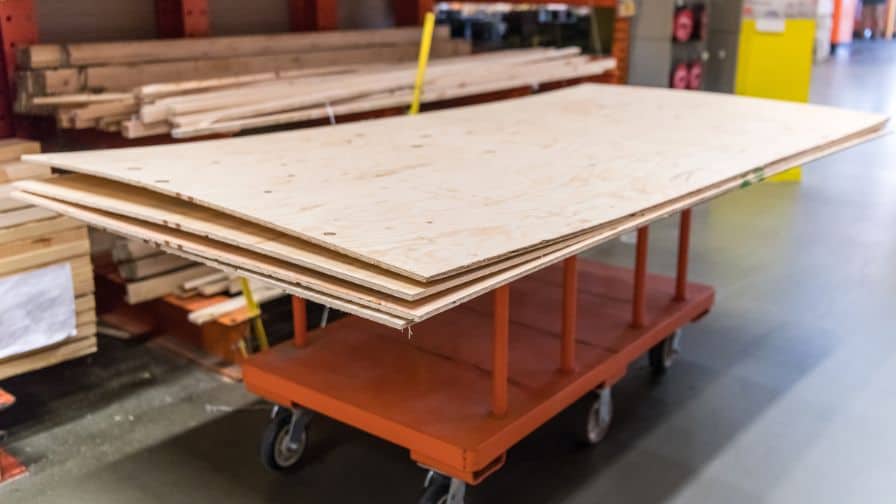
When you’re looking for an affordable way to create walls in your shop, consider using plywood. This wood is a versatile material that can serve a variety of purposes, including building walls. It is a good option when you are on a budget, and it can customize to suit your needs.
In this blog post, we will discuss the benefits of using plywood to make shop walls, and we will provide some tips on how to do it effectively.
What Are The Benefits Of Using Plywood To Create Shop Walls
Plywood is an ideal material for creating shop walls because it is strong, durable, and easy to work with. It has a reasonable price range, making it a practical option for those on a tighter budget! Additionally, plywood can have paint or stain to match the existing décor in your shop.
Another benefit of using plywood to produce shop walls is that it can cut to size easily. This means that you can customize your shop walls to fit your specific needs and space limitations.
Additionally, plywood is easy to install, so you can do it yourself without having to hire a professional.
Overall, using plywood to come up with shop walls is a great option because it is budget-friendly and easy to work with. It can also have cut to size and installed quickly and easily, making it a superb choice for those who want to get the job done themselves. Give it a try the next time you need new shop walls! You may get surprised at how well it works!
How Can You Customize Plywood To Suit Your Needs
You can use plywood to create cabinets, shelving, or even furniture. It’s so strong and durable making it an excellent choice for exterior applications like siding or decking! But what if you want to customize plywood to better suit your needs? You can do this by cutting it into different shapes or sizes, or even adding a veneer.
Here are some tips on how you can customize plywood to better suit your needs:
-Cut it into several shapes or sizes: You can use a saw to cut plywood into diverse shapes or sizes. This is a fantastic way to build custom pieces for your home or office!
-Add a veneer: Veneering plywood is a fabulous way to add an extra layer of protection! It also gives the wood a more finished look.
-Stain or paint it: You can also stain or paint plywood to better suit your needs. This is a magnificent way to add some extra character to a piece of furniture or cabinetry!
Plywood is a flexible material that can suit multiple projects. By following these tips, you can customize it to better suit your needs! Happy building!
What Are Some Tips For Installing Plywood Walls In Your Shop
When you’re looking to add some extra protection to your shop walls or want a more sturdy surface to work on, installing plywood is a remarkable option!
Here are some tips to help you get the task done right:
– Start by measuring the area you want to cover and purchasing sufficient plywood to complete the project.
– Once you have your materials, cut the plywood to size using a saw. When you’re not comfortable doing this yourself, ask a friend or family member for help.
– Next, use construction adhesive to attach the plywood to the wall. Apply it evenly and press the plywood firmly into place.
– To finish, add some trim around the edges of the plywood for a polished look. You can also paint or stain the wood to match your shop’s décor.
With these tips, you’ll have your plywood walls up in no time! Not to mention, you’ll take on tougher projects with confidence knowing your walls can handle anything you throw their way.
How Can You Make The Most Of Your Plywood Shop Walls
One way to take advantage of your plywood shop walls is by installing wall-mounted cabinets. This will give you extra storage space for tools, materials, and other items. You can also use the cabinets to organize your work area so that it is more efficient.
Another option is to install a pegboard on one or more of the walls. This will give you a place to hang tools and other items so that they are within easy reach.
You can also use the walls to display photos, artwork, or other items that inspire you. This can help to make your work area more enjoyable and motivating!
Whatever you decide to do with your plywood shop walls, make sure that it will work well for you and your needs. Take the time to plan out what you want to do so that you can get the most out of your space.
With a little bit of effort, you can transform your plywood shop walls into a functional and stylish space!
Is Plywood Good For Garage Walls?
Plywood is a recommended material for garage walls because it is strong and durable. It is also easy to install and can have paint or stain to match your decor. Plywood is an excellent choice for garage walls because it is fire resistant and will not rot or mildew.
However, water can damage plywood so it should have a waterproofing sealer before painting or staining. Use good quality plywood for your garage walls to ensure it will last for many years.
When you are looking for an inexpensive way to finish your garage walls, plywood is a fantastic option! You can find plywood at most home improvement stores and it is easy to work with. With a little bit of effort, you can have beautiful garage walls that will last for years to come!
How Thick Should Plywood Appear For Garage Walls?
Most people think that thicker is better when it comes to plywood, but that’s not always the case. For garage walls, you’ll want to use plywood that’s only about ¾-inch thick. Anything thicker than that will get too difficult to work with and can crack or break during installation.
Plus, it’s only overkill for a thing like garage walls. Plywood with 3/4 inch is strong and will provide plenty of stability. Also, it’s less expensive than thicker options, so you’ll save some money as well.
So next time you’re at the store, pick up some ¾-inch plywood for your garage walls. It’s the perfect thickness for the job and will save you time and money in the long run.
What Kind Of Plywood Do You Use For Garage Walls?
When you’re looking to add some extra protection to your garage walls, you may wonder what kind of plywood to use. There are a few options available, and the best one for you will depend on your budget and desired level of protection.
The most common type of plywood used for garage walls is oriented strand board (OSB). This type of plywood comes from smaller pieces of glued and pressed wood. OSB is a good choice for garage walls because it’s strong and inexpensive.
When you’re searching for a stronger material, you may want to consider using plywood with fire retardant chemicals. This type of plywood is more expensive, but it will provide better protection in case of a fire.
As you’re looking for the strongest type of plywood, you’ll want to choose marine-grade. This type of plywood can withstand high moisture levels, making it ideal for use in garages. Marine-grade plywood is more expensive than other options. But it will provide the best protection for your garage walls.
No matter which type of plywood you choose, make sure to install it properly to ensure the best level of protection. Work with a professional when you’re not confident in your ability to install the plywood correctly. With proper installation, you can rest assured that your garage walls will have protection.



